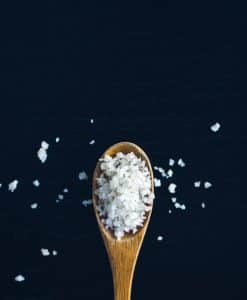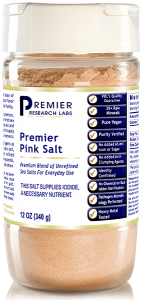
Salt has been made the bad guy in the medical world for years. Sodium, one of the minerals in salt, may raise your blood pressure and cause hypertension. This is certainly a concern for people whose diet consists heavily of processed foods, fast food, or other restaurant food where sodium levels are extremely high.
However, for those who eat homemade food, our sodium intake is much lower. This becomes important (especially if someone exercises regularly and/or intensely) because our bodies need electrolytes to properly function, and salt is mainly made up of two of these electrolytes: sodium and chloride. People who live a very ‘clean’ lifestyle with little to no processed food and regular workouts may find they need to make sure they are adding a little extra salt to their meals.
Choosing a Safer Salt
Regardless of whether you are trying to increase, maintain, or decrease your salt intake, it’s important to make sure that when you do use salt, you’re choose a quality brand. Like many other foods, there are options on the market that are better for you, and some that are worse for you. When it comes to salt, there are a few things to consider: microplastics, mineral content, iodine, and processing with additional agents.
What are Microplastics?
Microplastics are exactly what they sound like: microscopic pieces of plastic. Unfortunately, they are often found in conventional sources of salt. In fact, National Geographic found that 90% of the table salt they tested contained microplastics. Additionally, studies have shown that the average adult consumes about 2,000 microplastics through salt each year.
Mineral Content
Sodium and chloride, both electrolytes, are the main minerals in table salt. However, depending on the origin of the salt and the processing method, different salts will contain different amounts and types of minerals.
These minerals/electrolytes (in the right amounts) are incredibly important to your health, as they facilitate and support innumerable bodily processes, like building bones, transmitting nerve pulses, supporting hormones, and more. The more variety of minerals you can get from your salt, typically the better.
Iodine & Iodide
Iodide is the ionic state of iodine, so for simplicity, we will refer to iodine in this post. Most table salt used today is iodized in order to combat an iodine deficiency. Iodine plays an important role in thyroid function, so if you suspect or know that you have an issue with your thyroid (either hypothyroid or hyperthyroid) we recommend discussing with your trusted healthcare provider whether you should opt for iodized or non-iodized salt.
Processing Agents
Many table salts have more ingredients to them than just salt. For example, Morton’s Table Salt, a common choice among households, contains salt, calcium silicate, dextrose, and potassium iodide. We believe that when it comes to what you put in and on your body, the fewer ingredients and the more natural the ingredients, the better.
A Safer Salt

Premier Research Labs Premier Pink Salt (which we carry in our office, and use in our own homes):
- Uses untreated, unheated, solar-dried sea salt from the Mediterranean and Hawaii.
- Does not use any additional ingredients, like aluminum hydroxide, stearic acid, or calcium phosphate, as “anti-clumping” agents
- Contains 39+ raw minerals
- Is tested for heavy metals
- Is manufactured in a cGMP (current Good Manufacturing Practice) compliant facility for superior quality assurance
We’d encourage you to take a look at the Premier Pink Salt next time you are in the office. It’s not only our favorite, but is a patient favorite too – and one of the most sold items in our office. July is the perfect time to stock up on Pink Salt to prepare yourself for the barbecues and family gatherings this summer! (PS – check out Dr. Aaron’s “famous” chicken wing recipe here!)

